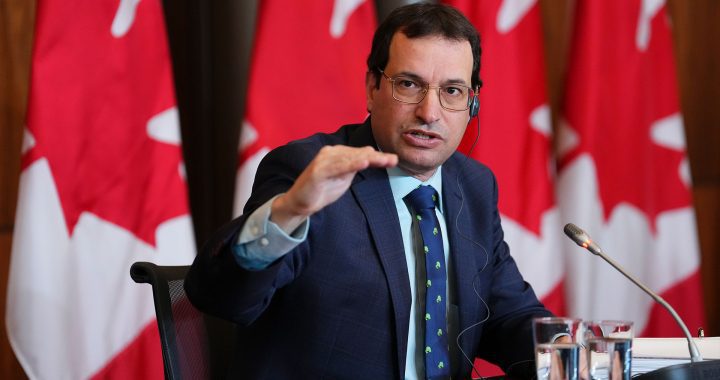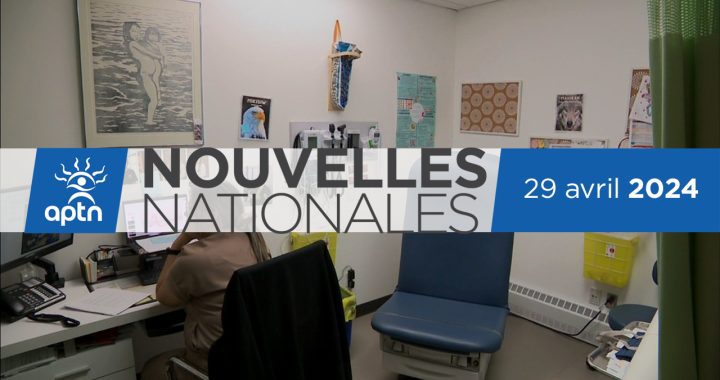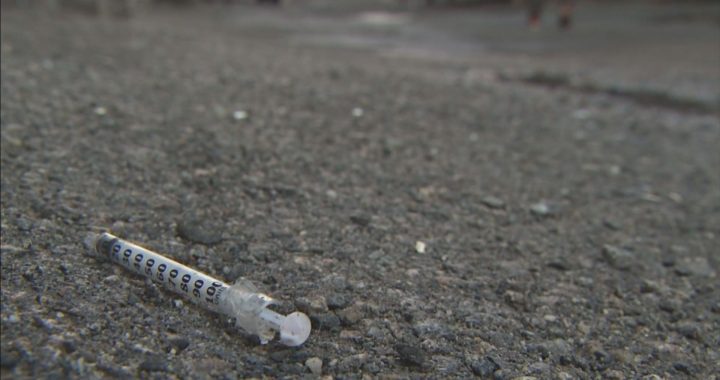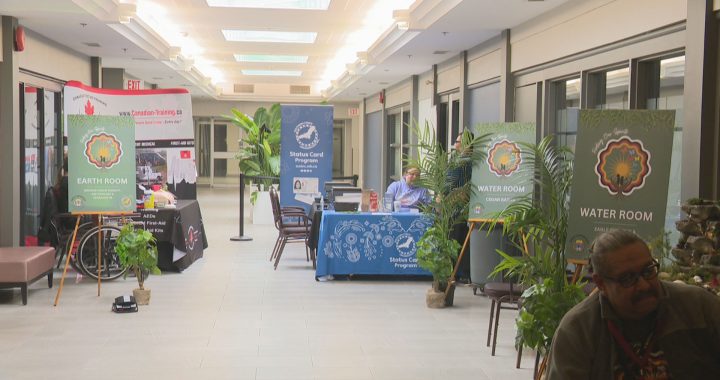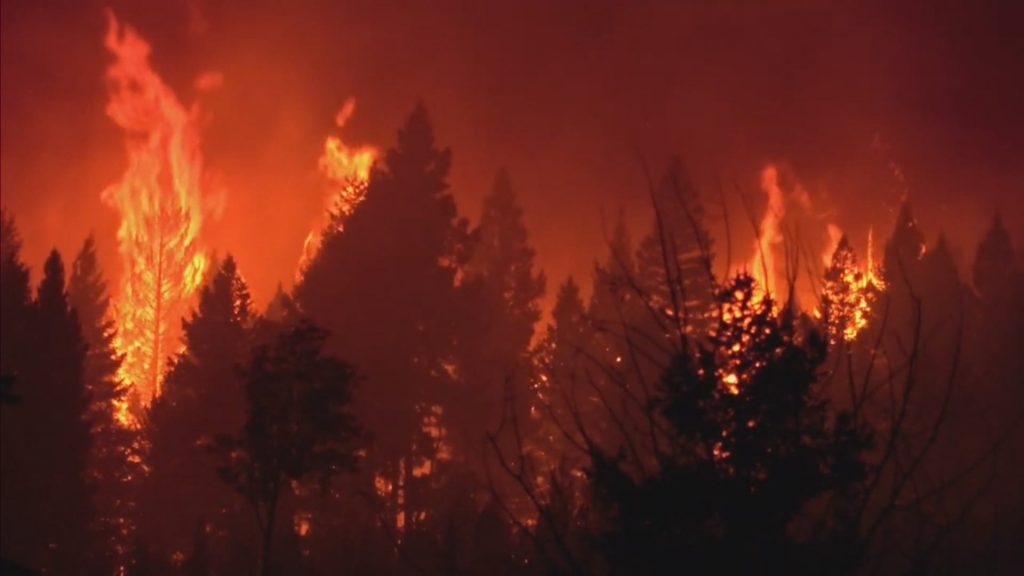
Nearly 5,000 people were evacuated due to wildfires in the B.C. interior this summer. Photo: APTN
A week before the Canadian federal election was called, the Intergovernmental Panel on Climate Change dropped a report that the head of the United Nations described as a “code red for humanity” and a “death knell” for fossil fuels.
But for many Canadians the catastrophic realities of climate change were already clear.
This summer, British Columbia was hit with a deadly record-breaking heat wave followed by a wildfire season where infernos tore through large swathes of the province. Blazes scorched the Prairies and northern Ontario too, prompting widespread evacuations.
The smoke even made it to the nation’s capital, blanketing the seat of federal power in a thick grey haze.
A month before that, the Canadian government released a report of its own, warning that current efforts to adapt to climate change are inadequate while “the window for taking action to reduce increasingly severe impacts is rapidly closing.”
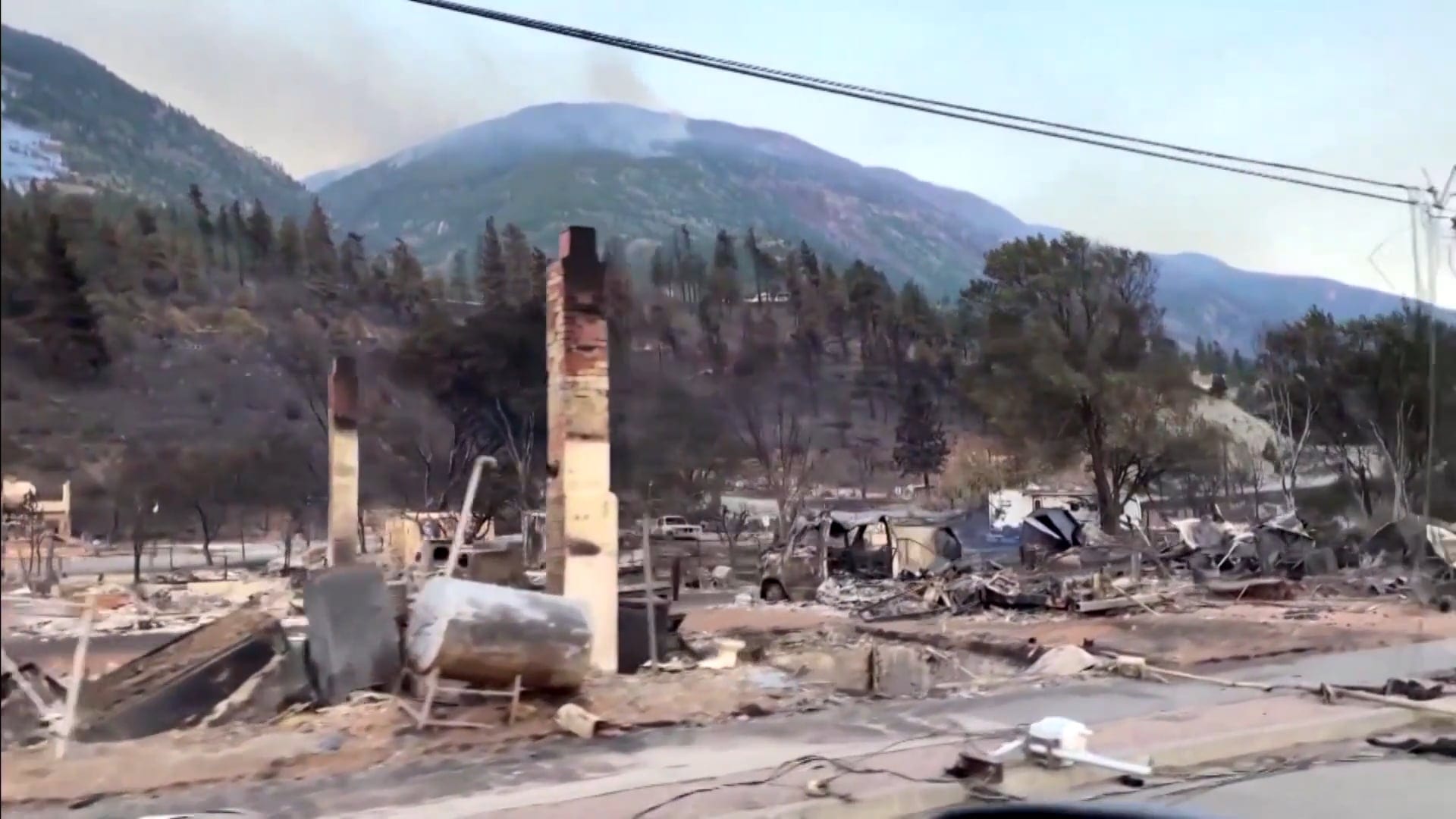
The report warned of a grim new reality: more floods, droughts and wildfires that will be more costly and severe.
“We are experiencing more extreme heat, less extreme cold, longer growing seasons, shorter snow and ice cover seasons, earlier spring peak streamflow, thinning glaciers, thawing permafrost and rising sea levels,” it said.
It set the stage for the climate crisis to be the top concern for many as they head to the ballot box on Sept. 20.
With only days to go, APTN News spoke with experts and observers to get a sense of what each party is proposing.
Liberals pledge to maintain commitments
The Liberals promise to reduce carbon emissions by 40 to 45 per cent by 2030 compared to where they were in 2005. This is in line with Ottawa’s current targets under the Paris Agreement, an international treaty to keep global warming below 2 C compared to pre-industrial levels.
They promise to keep their signature carbon pricing scheme in place. It’s often called a tax but the Supreme Court of Canada said it’s a regulatory fee Ottawa is allowed to impose to counter the grave existential threat posed by climate change.
It currently sits at $40 per tonne.
The Liberals also pledge to continue developing their Indigenous Guardians program that was established in 2017. The program facilitates co-management and stewardship of the environment and led to the creation of the country’s first “Indigenous protected and conserved area,” according to the platform.
The incumbent party says it will work with Indigenous communities on co-management agreements for 10 new national parks and 10 new marine conservation areas. They want to conserve 25 per cent of the country’s lands and waters by 2025, rising to 30 per cent by 2030.
The Liberal plan has been called achievable by some experts, but others question whether it’s bold enough to address the dire urgency of the situation.
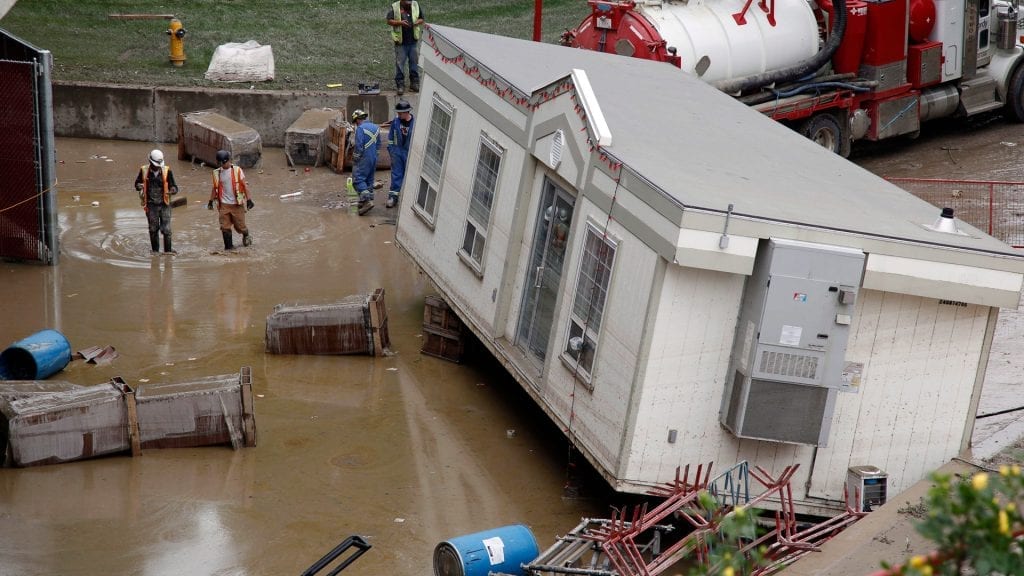
“I differ with some of my colleagues that are a little bit more generous on the Liberal plan because it’s more realistic. It’s more pragmatic,” said Ryan Katz-Rosene, an associate professor at the University of Ottawa who studies climate policy and political economy.
“I think that’s only half the story. The other half of the story is: We have a massive crisis, an existential crisis on our hands, and it’s the kind of crisis that requires us to think beyond the status quo.”
Katz-Rosene said the Liberal plan represents the next step on a path the party has charted over the last six years. During that period, the Liberals have been criticized at times for their handling of certain aspects of the file.
The other parties have said that emissions have actually gone up, not down, since the Liberals took over in 2015. The Liberals purchased the Trans Mountain pipeline with $4.5 billion in taxpayer cash in 2018.
A notable Liberal pledge during the election campaign a year later was to plant two billion trees over the next decade. The party’s critics like to point out not one seedling has hit the dirt.
Conservatives to roll back climate targets
The Conservatives plan to reduce emissions by 30 per cent from 2005 levels, a rollback of the original Paris Agreement target that has since increased.
The Tories want to maintain a carbon pricing scheme by creating what they call a “personal low carbon savings account.” The plan would levy a lower figure of $20 per tonne, whose proceeds would flow into personal accounts that people can use to buy things that make their lives greener. Details about how the program would function are scant.
The Tories also promise to maintain the Indigenous Guardians program spearheaded by the Liberals and expand the creation of the Indigenous protected areas. The party proposes to conserve 17 per cent of the country’s lands and water while aiming to grow that figure to 25 per cent by 2030.
Observers have noted that the presence of a climate change plan is a shift for the party. Only five months ago, the Conservative convention’s delegates voted against adding “climate change is real” to party policies.
“Their platform has come a long way,” said JP Gladu, acting executive director of the Indigenous Resource Network and a member of Sand Point First Nation. “I think him and his team have put a lot of time and effort into supporting Indigenous economic prosperity.”
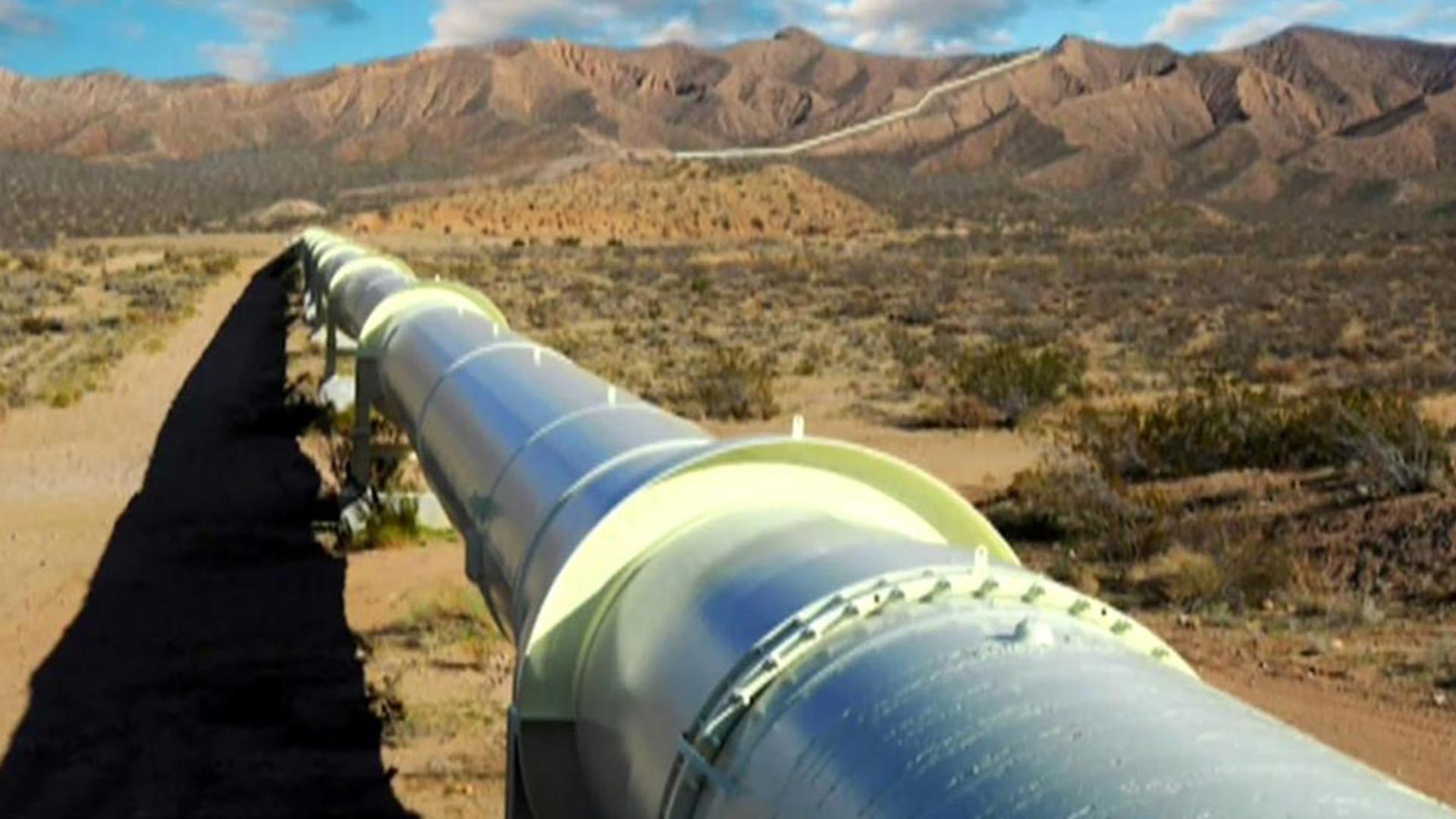
Gladu’s organization was founded last year and aims to support First Nations who want to engage in resource development. The network commissioned an Environics Research poll earlier this year that surveyed 549 First Nations, Inuit and Métis people living in rural areas or on reserves about their views on resource development.
The firm found the majority of respondents supported resource development projects, especially if the projects follow best practices for consultation, Indigenous inclusion and safety.
“Oil and gas isn’t going away in our world. It’s going to be a main part of the way we combat poverty,” Gladu said. “When you couple that with the Indigenous participation in the way that we develop our resources projects, the way the communities start to benefit from these projects, it just makes a lot more sense to be tapping into our own resources.”
The Conservatives’ Indigenous platform promises to foster economic reconciliation and support communities who wish to engage in resource extraction. The party would amend the Impact Assessment Act that subjects proposed projects to an environmental review.
The Tories pledge to prioritize pipelines that export Canadian oil to foreign markets and streamline projects that partner early with First Nations.
NDP plan more ambitious
The New Democratic Party promises to curb emissions to 50 per cent, a more ambitious target than the two other parties.
But the NDP has been scrutinized for the lack of details in its platform, with some observers suggesting the party needs to be more forthright about how much it would cost to drastically reduce emissions.
“Canadians want to do good by their global commitments. We want to be contributing to climate change mitigation,” said Katz-Rosene. “But the reality is, in order for us to do that we really have to dramatically change our economy very quickly. And that’s just this impossible problem.”
The NDP also promises to expand the Indigenous Guardians program while upholding traditional knowledge and respecting Indigenous sovereignty.
It’s the only platform to mention Indigenous sovereignty. Aside from the Indigenous Guardians program, all the platforms have few other references to incorporating Indigenous knowledge or respecting Indigenous jurisdiction.
Read more:
New UN report on climate change says some effects ‘irreversible’ over hundreds, thousands of years
Floods, drought and wildfires will worsen as Prairie climate warms, says federal government report
Kristen Bos, assistant professor of Indigenous science and technology studies at University of Toronto, said the debate among the party leaders left much to be desired on those issues.
“We really see no conversation around the role of Canada as a country that creates pollution, that creates harms to health, and that does it through what we would talk about as colonialism,” said Bos, who is Métis from northern Alberta.
“When I look at the election and when I think about what each of the leaders are saying, I don’t see the seriousness of the Intergovernmental Panel on Climate Change report being taken into account.”
Green party to end fossil fuel production
The Green Party party promises to reduce emissions by 60 per cent, abolish fossil fuel production, cancel all new pipeline projects and ban hydraulic fracturing.
The Greens also support the Indigenous Guardians program and promise to incorporate Indigenous knowledge into the decision-making process.
But Katz-Rosene said the Green plan suffers from a perceived lack of feasibility among the critics. One of the big stories of this election is the discrepancy between the plans’ ambition and feasibility, he said.
The Liberal and Tory plans are less ambitious but more feasible. They promise action on climate change while ensuring fossil fuel production continues.
NDP and Green plans are more ambitious but less feasible, he said. These parties propose policies that would amount to costly and radical shifts in the Canadian way of life, something both need to be up front about.
“They’re more idealistic,” he said, “but climate change is a civilizational threat.”
The Bloc Québécois had more seats than the NDP in the House of Commons prior to the dissolution of Parliament.
The Bloc supports ending fossil fuel subsidies and diverting the cash into green technology. The party’s platform said the Bloc will oppose the construction of pipelines that would run through Québec territory and demand Ottawa say no to all new interprovincial oil transport





